Ants are truly fascinating creatures, with a world of intricate behaviors and remarkable abilities hidden beneath their tiny exoskeletons. One aspect of their existence that often goes unnoticed but is truly captivating is their sense of what people can smell them.
While it may be easy to overlook the olfactory prowess of these small insects, ants possess an extraordinary ability to perceive and communicate through scents. In fact, their sense of smell plays a fundamental role in their daily lives, from foraging for food to identifying nestmates and even defending themselves against potential threats.
Overview of ants and their remarkable sense of smell
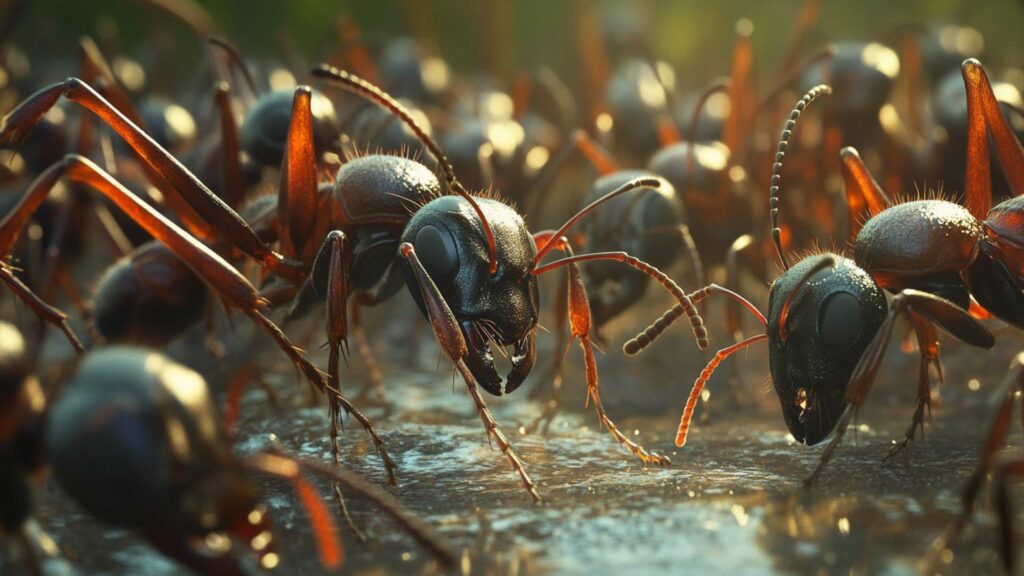
Ants belong to the family Formicidae, a diverse group comprising over 12,000 known species globally. These industrious insects live in sophisticated societies organized into colonies led by queen ants.
Within these colonies, various tasks are assigned to different castes—workers search for food, tend to the young, and defend the nest against intruders. One key attribute that aids ants in carrying out these tasks is their ability to detect smells with exceptional precision.
They rely on chemical communication through pheromones—volatile compounds secreted by specialized glands located throughout their bodies. Pheromones act as potent messengers within the ant community, allowing them to convey vital information about food sources, nest locations, or even danger signals.
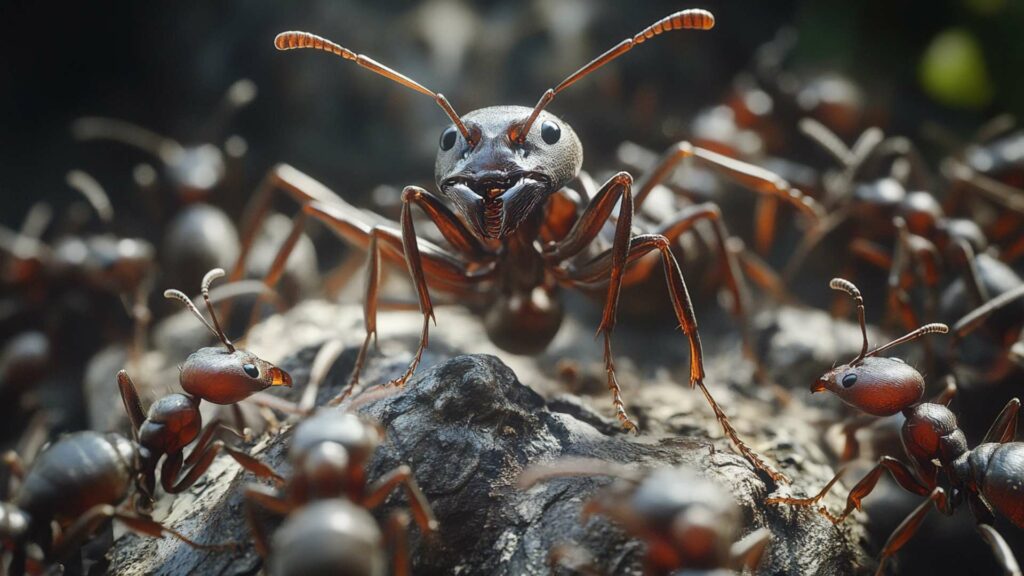
This chemical language is not only crucial for individual survival but also forms the backbone of social cohesion within ant colonies. The exchange of pheromones allows ants to recognize one another as members of the same colony while aiding in coordinating collective activities such as foraging or building intricate nests.
The significance of this olfactory acuity becomes evident when we consider the vast distances that some ant species traverse during foraging expeditions or when they respond swiftly as a unified force against potential threats. It’s no wonder that researchers have been captivated by ants’ remarkable sense of smell and the pivotal role it plays in their lives.
By understanding how ants perceive and utilize scents, we can gain insight into their complex behaviors and unravel the intriguing world of these industrious insects. So, let’s dive deeper into the world of ant smells and uncover what they truly smell like.
Ants and Chemical Communication
When it comes to communication, ants have a secret weapon: pheromones. These remarkable chemicals play a crucial role in the social organization of ant colonies. Pheromones are like tiny messenger molecules that ants release into the environment, carrying important information that is decoded by their fellow ants.
It’s almost like they have their very own chemical alphabet! One of the primary functions of pheromones in ant communication is marking trails.
When an ant discovers a food source or an intriguing new territory, it leaves behind a trail of pheromones for its nestmates to follow. This allows other ants to find the same resource efficiently, creating impressive foraging networks that can span vast distances.
Ants also use chemical signals to identify their nestmates and distinguish them from intruders or members of rival colonies. Each ant colony has its unique scent profile, much like humans have distinct fingerprints. Through this olfactory fingerprinting system, ants can quickly recognize members from their own colony and react accordingly.
Interestingly, different ant species use various compounds as pheromones to mark trails and identify nestmates. For example, some species employ formic acid as their primary trail marker, while others rely on methyl ketones or other intriguing substances.
The specific scent profile varies among species but remains consistent within each colony. So next time you see a line of ants marching diligently along a path or forming harmonious clusters near their nests, remember that there’s an intricate world of chemical messages guiding them every step of the way!
The Scent of Ants
When you think about ants, you might not immediately consider their ability to smell anything. However, these tiny creatures do indeed have a distinct odor that can be quite noticeable if you get up close.
The scent of ants is often described as musty or earthy, with some people even comparing people smell of it to the smell of rotten coconuts or vinegar. This unique aroma comes from the various chemicals and pheromones that ants release, which play a crucial role in their communication and organization within the colony.
While all ants have a characteristic smell, there are variations based on factors like species and diet. Different ant species emit specific smells that can help identify them when people smell ants. For example, carpenter ants have a distinct odor characterized by a faint lemon-like scent mixed with woodsy notes.
On the other hand, odorous house ants emit a coconut-like odor when crushed or threatened, giving them their name. Apart from species differences, an ant’s diet can also influence its scent profile.
Just like with humans who consume certain foods that affect body odor (think garlic or onions), what ants eat can alter their smell too. Ants that primarily feed on sugary substances may have sweeter-smelling trails compared to those feeding on protein-based diets.
Ant researchers have identified some of the specific chemical compounds responsible for these scents. For instance, oleic acid is commonly found in many ant species and contributes to the overall smell they emit.
Methyl ketones are another class of compounds that contribute to the distinctive aroma associated with certain ant species. Understanding the unique odor produced by ants and how it varies among different species and diets provides fascinating insights into their complex world of chemical communication and behavior.
Identifying Ant Smells
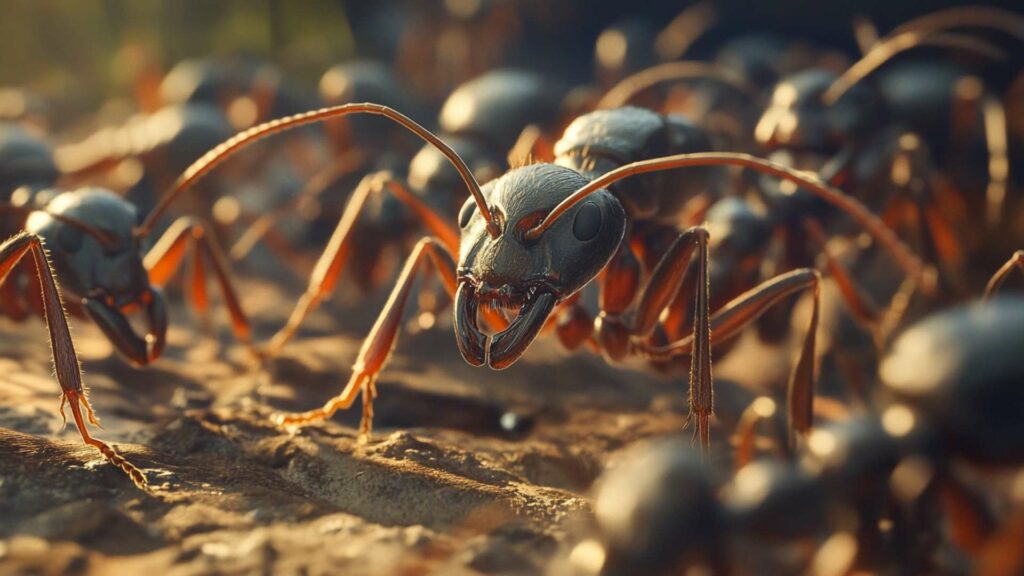
When it comes to describing ant’s smell or the general smell associated with ants, there is a common consensus among those who have had close encounters with these tiny creatures. The scent emitted by ants can be best described as pungent and acidic, often reminiscent of vinegar.
This characteristic odor is not overpowering but rather distinct enough to recognize in close proximity. It’s important to note that the intensity of the smell may vary depending on factors such as the size of the ant colony and its activity level.
While there is a general smell associated with most ants, it’s fascinating to discover that different ant species can have their own specific smells. Take carpenter ants, for example—they emit an odor that resembles ants smell like rotten wood when disturbed or crushed. On the other hand, odorous house ants produce a scent often described as “coconut-like.” These variations in fragrance can be attributed to differences in chemical composition within their pheromones or other glandular secretions.
Furthermore, ant behavior can also influence their scent production. For instance, when an ant dies, it releases chemicals known as alarm pheromones which alert other members of the ant researcher or colony about potential threats.
This particular odor differs in dead ants from their regular scent and serves as a warning signal for nearby ants. It’s interesting to note that humans may not easily detect these alarm signals unless they come into direct contact with a dead ant or disturb an area where these chemicals are present.
While there is a general smell associated with most ants—pungent and vinegar-like—variations exist between different species and even within specific behavioral contexts. Understanding these nuances not only enriches our knowledge about these remarkable insects but also highlights their ability to communicate through the olfactory realm.
The Science Behind Ant Smell
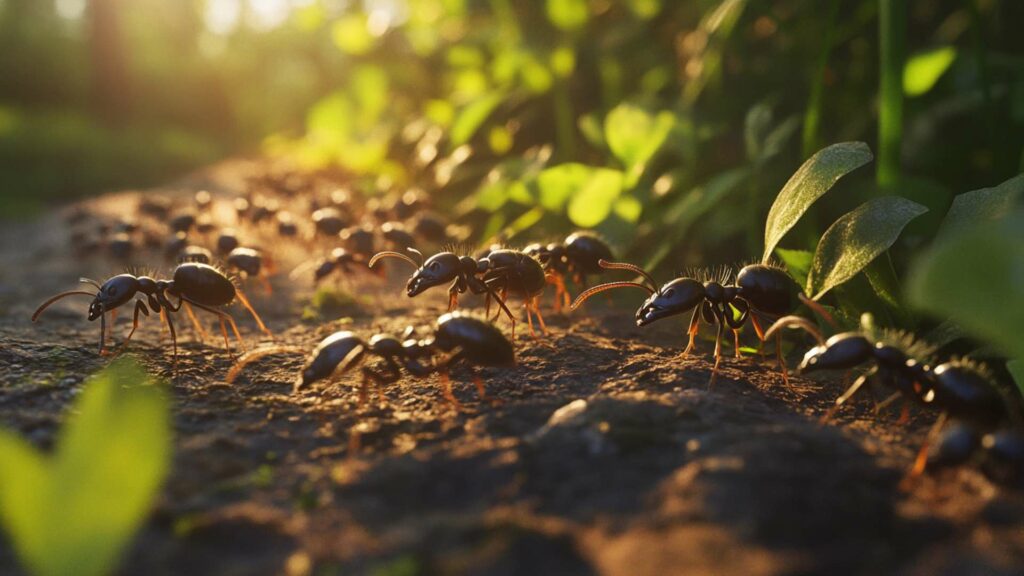
Ants may be tiny creatures, but their olfactory abilities are quite remarkable. The secret lies in their antennae, which house specialized sensory organs known as olfactory receptors.
These receptors are responsible for detecting and interpreting different odors from the environment. In fact, ants possess an impressive number of these receptors, allowing them to perceive a wide range of scents with great precision.
The exact number of olfactory receptors varies among ant species, but it can reach into the thousands or even millions! This abundance of receptors demonstrates just how important smell is to ants’ everyday lives.
When it comes to perceiving smells, ants have a complex sensory system that enables them to navigate their surroundings effectively. When an ant encounters a specific smell in its environment, such as food or danger nearby, its olfactory receptors detect the odor molecules present in the air.
These molecules bind to specialized proteins within the receptors and trigger electrical signals that travel to the ant’s brain. Through this process, ants can distinguish between various odors and respond accordingly.
Interestingly, some species of ants use distinct smell-based communication methods for specific purposes. For example, when encountering a threat or feeling they feel threatened themselves, certain types of ants release a strong odor called formic acid as a defense mechanism.
This pungent scent serves as a warning signal to other ants and colony members that danger is lurking nearby. Overall, the science behind ant smell reveals an intricate system where their antennae and olfactory receptors work harmoniously to enable these tiny insects to perceive and interpret various scents present in their environment effectively.
Unusual Facts about Ant Smells
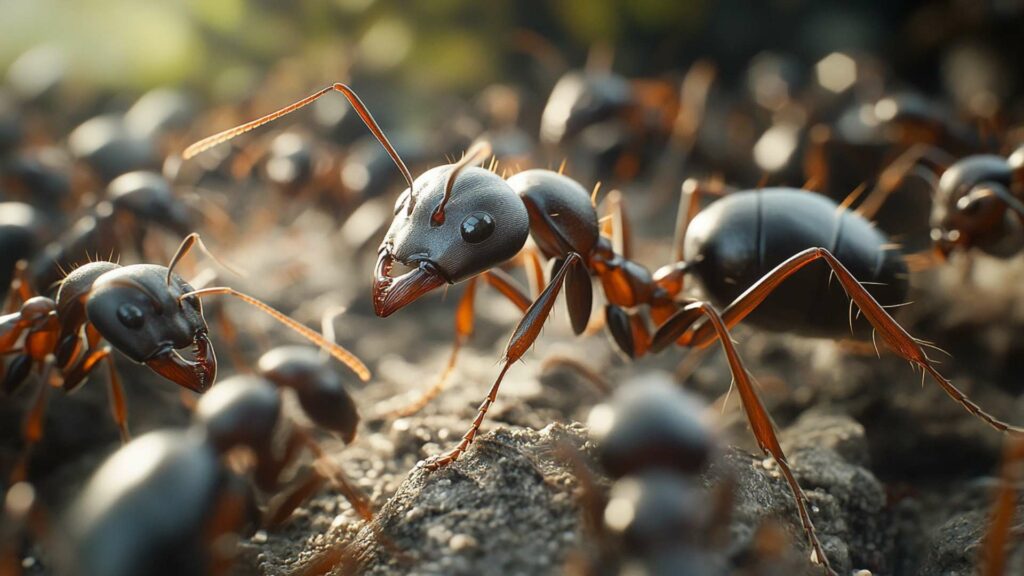
Ants are known for their distinctive scent, which can vary greatly depending on the species. While some ants may emit a smell similar to vinegar or lemon, others may surprise us with unusual fragrances and strong odors that defy our expectations. For instance, odorous house ants have been described as smelling like rotten coconut or blue cheese.
Some species of ants produce a pungent odor akin to penicillium mold, while others release a scent reminiscent of olive oil. These unique aromas not only serve as a means of identification but also play a crucial role in the complex world of ant communication.
Importance of Ant Smells in Ecology
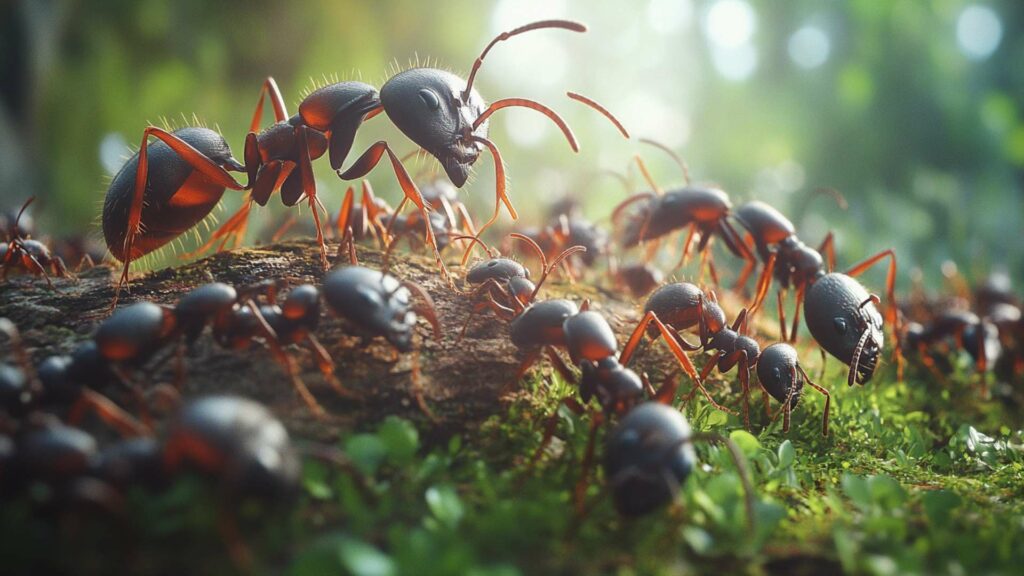
The scents emitted by ants are not merely intriguing curiosities; they serve vital functions in the ecology of these tiny yet remarkable creatures. Ant smells contribute to various ecological interactions, such as predation and competition. Certain ant species release defensive chemicals that act as warning signs for other creatures, indicating danger nearby.
Additionally, these scents play a significant role in foraging efficiency and resource allocation within ant colonies. By leaving trails marked with specific pheromones, ants are able to guide their nestmates towards food sources and efficiently communicate information about available resources.
The knowledge gained from studying ant smells has practical applications in various fields. For instance, ant pheromones can be harnessed for pest control strategies.
By identifying and mimicking specific ant pheromones that signal danger or mark territories, scientists can develop effective methods to deter pests smell ants from infesting homes or agricultural areas. Moreover, understanding how ants respond to different smells can aid researchers in studying insect behavior more comprehensively and provide insights into broader ecological systems.
Conclusion
Ants produce a fascinating array of scents that serve as their means of communication and survival. From surprising fragrances like vinegar or lemon to lesser-known odors such as penicillium mold or olive oil, ant smells are far from ordinary. These scents not only help ants identify themselves and their nestmates but also play essential roles in ecological interactions, foraging efficiency, and resource allocation within colonies.
Harnessing the knowledge about ant scents can lead to innovative pest control strategies and contribute to a deeper understanding of insect behavior. The olfactory abilities of ants remind us of the incredible intricacies present in even the tiniest creatures, offering a glimpse into the astounding diversity of nature’s creations.
Dissuade Ants with D-Termination: Las Vegas’ Top Pest Control Choice!

If you’re experiencing ant challenges, D-Termination is your solution. Our skilled team excels at deterring ants, rejuvenating cleanliness, and preserving the integrity of your area. Bid farewell to ants—opt for D-Termination for effective pest control today!
Reach out to us at 702-919-6310 or visit dtermination.com to schedule your ant control service and regain your space from these unwanted pests.
Frequently Asked Questions:
Ants can emit and detect chemical scents, which play a role in their communication and navigation.
House ants may not have a particularly strong or unusual odor.
Common house ants often have a mild, nondescript scent.
When ants are squished, they can release a slightly pungent odor, but it’s not especially strong or distinct.








